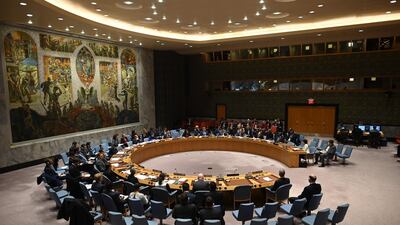Questions are being raised over the viability of the United Nations' current system as member states have failed to come up with a resolution on the worst pandemic since the UN was formed.
As it gears up for its 75th anniversary later this year, UN Security Council member states are at loggerheads over whether to include lifting sanctions on Sudan and Zimbabwe in any Covid-19 resolutions.
The global pandemic has raised – yet again – a perennial issue over jurisdiction at the UN with some member states are saying that the General Assembly, not the Security Council, should handle any resolutions.
Unlike the General Assembly, five permanent members of the Security Council can veto any resolution.
Washington's insistence that Covid-19 be called the "Wuhan Virus" in any statements or documents hampered initial efforts for a resolution in March.
Several UN-based diplomats spoke about the latest obstacles hindering a unified stance from the UN on the coronavirus. France and Tunisia, who initially had separate draft statements, hare now working together on a single message.
"The Covid-19 resolution that was consolidated from the French and the Tunisian resolutions is currently under negotiations," Liisa Toots, from the Permanent Mission of Estonia to the UN, told The National.
Estonia is heading the Security Council for May.
A "few" Security Council member states "indeed have proposed to write in a paragraph on raising sanctions," Ms Toots said.
A senior diplomat based in New York, who asked not to be named, said that South Africa was leading the efforts for sanctions to be eased on Sudan and Zimbabwe following the political developments that took place in 2019 in both countries.
The long-time president of Zimbabwe, Robert Mugabe, accused of human rights violations and widespread corruption during his 37 years in power, died last September shortly after Emerson Mnangagwa succeeded him.
While the latter has also been accused of human rights violations, the UN Secretary General has pressed Mr Mnangagwa on "pursuing inclusive policies and reforms that would deepen democratic and accountable governance, respect human rights and promote reconciliation and equitable economic recovery" and offered his support in the process.
For Sudan was once a home for Osama Bin Laden and has a long association with terrorist groups that led the US to place it on a list of state sponsors of terrorism in 1993. In February, UN Secretary-General Antonio Guterres said it was time for Sudan to be removed from the US list after longtime dictator Omar Al Bashir was forced from power by the military amid a national uprising and the country's military and civilian leaders have since forged a deal to transition to democracy.
The US designation makes it difficult, if not impossible, for Sudan to work with the IMF and World Bank although American officials say they are open to discussions on the matter.
In a sign of thawing ties, Sudan appointed an ambassador to Washington on Monday after US Secretary of State Mike Pompeo said last December that the two countries would exchange ambassadors.
But, Ms Toots said that sanctions are used to promote peace, democracy and respect for the rule of law, human rights and international law. "These sanctions do not undermine the fight against the Covid-19 outbreak and they do not in any way target medical supplies or humanitarian aid."
In New York, the UN diplomats who spoke to The National said that France was working to convince the so-called Permanent Five (P-5) members on the latest draft statement while Tunisia was working its diplomatic channels to convince the P-10 (non-permanent members) of the draft.
The resolution was supposed to be ready last week, the diplomats said, but now they will wait and see if any progress will be made this week.
Adding another problem for the Security Council is e-voting on the resolution. "They [member states and the UN] believe that e-voting will pose a security threat," the senior diplomat said.
"It's been three months and the UNSC can't agree on a resolution for Covid-19. At a time when people are talking about the need to work together, the Security Council is blocked. Has the UN succeeded in its [set up] for the P-5 veto power and is it viable for post-pandemic and the 21st century," the senior diplomat asked.
















